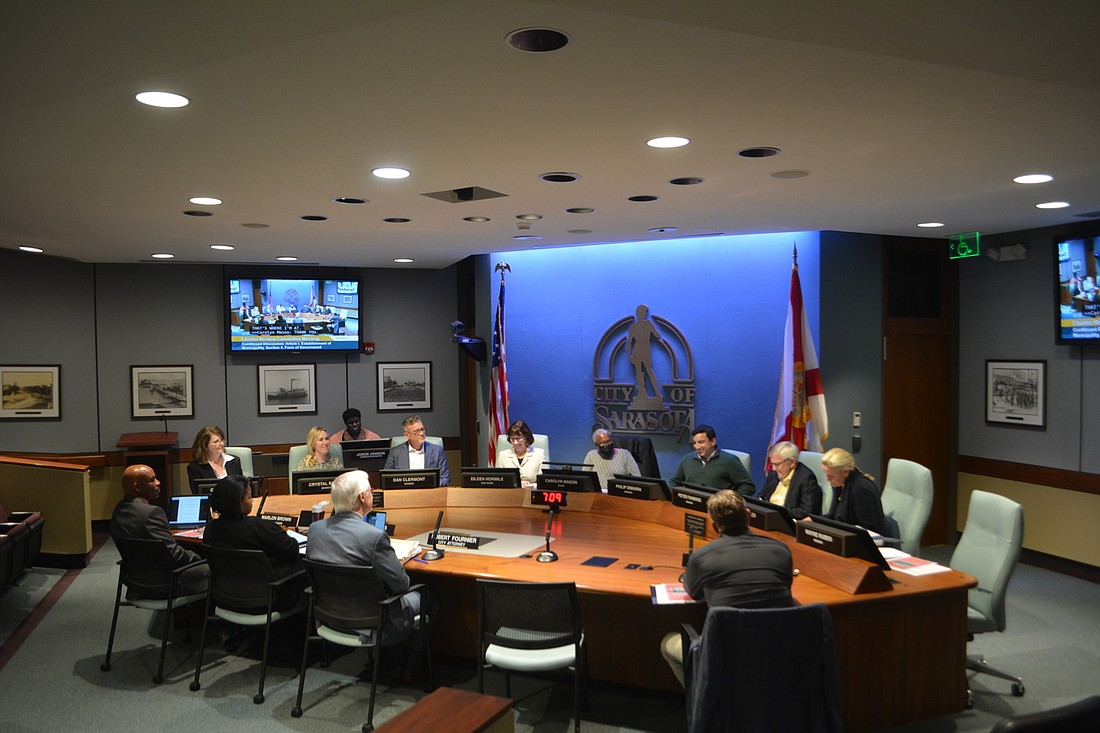- April 18, 2024
-
-
Loading

Loading

Overhauling a city’s form of government can be a complicated process.
It’s one thing to want a more powerful mayor, one who is directly elected by voters. But there’s a spectrum of power structures that fit under that broad description. How long are mayoral terms? What specific positions is the mayor responsible for overseeing? Does the mayor appoint charter officials, or is that responsibility left to the City Commission? Can the mayor exercise a veto?
These are some of the questions the city’s Charter Review Committee attempted to address at its Nov. 22 meeting. The committee, which meets once a decade to discuss potential revisions to the city charter, voted 6-3 on Nov. 9 to endorse discarding the current council-manager form of government in favor of one with an elected “strong mayor.”
As the committee worked through the details associated with a prospective strong mayor government, some members expressed frustration with the process of picking and choosing between options for individual variables that were ultimately interconnected.
“When I was a little girl, I had a book, and it had three parts — it was all different kinds of animals' heads, bodies and legs,” committee member Crystal Bailey said. “I’d laugh, because it’d have, like, ostrich legs on a wolf body or whatever. That’s kind of how I feel this process is starting to remind me of.”
Ultimately, a majority of the committee expressed support for a less powerful mayor position, one that would not have the ability to unilaterally hire or fire the city’s chief administrator. The board voted unanimously to maintain the City Commission’s authority to hire and fire a city manager.
Several committee members who favored an elected mayor said they were hoping to establish a consistent figurehead atop the local government to serve as someone who sets a vision for Sarasota, but they did not think that needed to entail a major overhaul of how the city operates.
“I don’t want this big-authority mayor,” committee member Kim Githler said. “That is not what I’m looking for. I‘m looking for someone to bring continuity and collaboration.”
The committee spoke positively about City Manager Marlon Brown, and several members sought to ensure any changes to the form of government would not preclude his continued involvement in city leadership. Committee member Philip DiMaria, who supported an elected mayor, said he was supportive of limiting the mayor’s powers if it meant the city could more effectively retain its professional staff.
“I just think about Mr. Brown and the incredible job that he’s done here in just one short year, and I would hate to see that talent leave the city,” DiMaria said.
Brown said he would not want to work under the direct authority of an elected mayor. He expressed concern that such a role would not offer the stability of his current job, where a majority of the City Commission would have to support removing him from his position.
“My biggest fear about working with one person, whether it’s a two-year term or four-year term, is I could be gone at that election,” Brown said. “The entire director-level positions could be gone in one election. You lose all of that institutional knowledge in one election on one day.“
The board initially discussed establishing a two-year term for an elected mayor, citing concerns from the public about the level of oversight associated with the position. Later in the meeting, however, the committee voted 7-2 in favor of recommending a four-year term for the mayor. Committee member Dan Clermont expressed trepidation about a shorter term, stating he did not want the mayor’s focus to always be on courting voters.
“That two years — my goodness, you are constantly raising money,“ Clermont said. “You are constantly in the grind of the election.”
Just before the meeting concluded, the committee moved toward reversing one of the major decisions it made at its Nov. 9 meeting. Initially, the committee recommended making the mayor a non-voting member of the City Commission who presides over meetings. Based on the discussion at the Nov. 22 meeting, the committee voted 6-3 against making the mayor position separate from the City Commission.
Clermont said he supported separating the mayor from the commission, arguing it was important to have an elected leader focused solely on policy, rather than just a hired administrator who also had to manage the day-to-day operations of the city.
“It’s having an elected mayor who has the responsibility of pulling the commission together and being that consensus-builder on city policy issues,” Clermont said.
But other board members suggested such a position was redundant, and that the mayor could be elected as one of the five members of the City Commission instead.
The committee did not decide whether the elected mayor would have a vote on the commission or the exact process by which the mayor would be elected. The committee is scheduled to present its final recommendations to the City Commission for consideration in March.